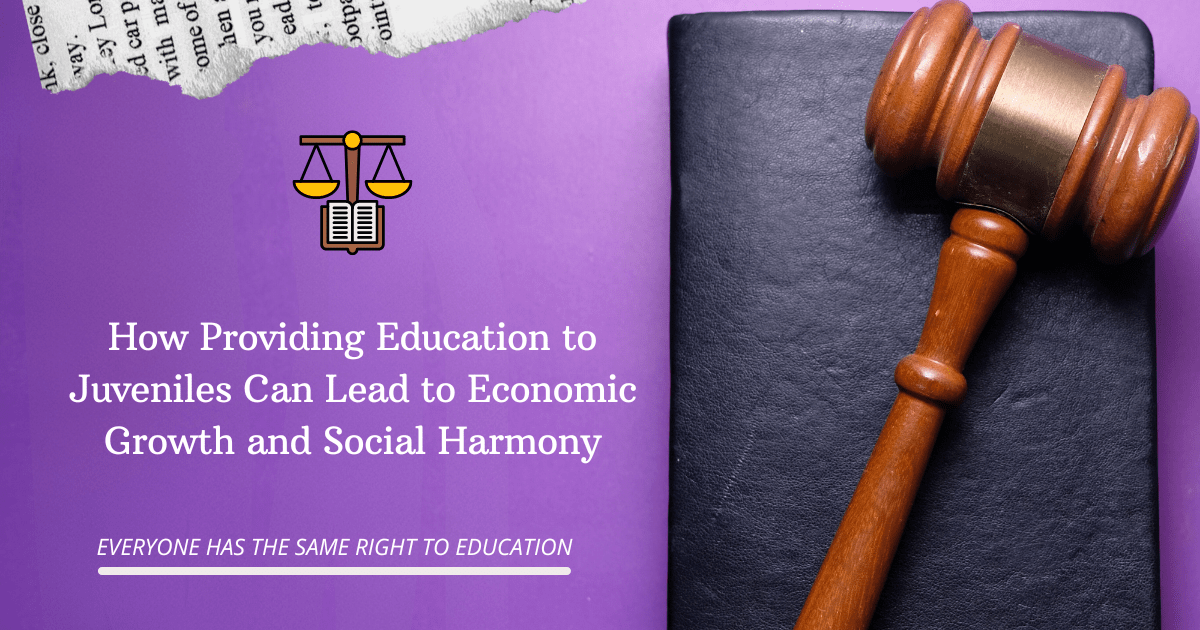How Providing Education to Juveniles Can Lead to Economic Growth and Social Harmony
The path from prison back to the outside world is a challenge. Picture someone stepping out from behind bars, hoping to start fresh. But instead of open arms, they find doors slammed shut—no place to live, jobs that seem out of reach, and friends who lead them down to old, dangerous roads. It’s a tough spot where one can feel trapped in a maze with no exit. The world outside moves on, but for them, time seems to stand still.
Yet, amidst the shadows of these challenges, there exists a powerful beacon of hope – Education. It’s a force capable of not just changing individual lives but transforming entire communities.

Understanding the Challenge
- Lack of Education: The lack of education severely restricts juveniles from accessing employment opportunities, effectively locking them out of the job market. Without the necessary skills and qualifications, these young individuals face significant barriers to entering stable careers.
- Employment Struggles Post-Incarceration: Finding employment after release is a significant hurdle for many, with employment rates for the former declining by 50% to 75%, according to studies. The stigma attached to a criminal record becomes a barrier to secure employment.
- The Barrier of Criminal Records: The existence of a criminal record can delay or even prevent employment opportunities. In Canada, the process for clearing a criminal record involves lengthy procedures, including fingerprint verification, which can take over three months to complete.
Studies show that young offenders without education face higher risks of returning to crime once released. However, we can break this cycle by providing them with educational opportunities, opening doors to employment and a better future.
Education acts as a Catalyst for change
Education for prisoners offers a way to break the cycle of reoffending, contribute to economic growth, and foster safer communities. Here’s how:
- Self Belief: Education not only serves as a tool for acquiring knowledge but also as a means of personal empowerment and self-reconstruction. It offers a foundation upon which incarcerated youths can build a new identity, one that is defined not by their past mistakes but by their current aspirations and future achievements.
- Reduced Recidivism: Providing education in Canadian prisons and through scholarships for juveniles significantly lowers the likelihood of reoffending.
- Economic Empowerment: Education of prisoners equips them with the skills needed to enter the workforce, thereby contributing to the country’s economy.
- Community Safety: Education fosters empathy and critical thinking, essential traits for building inclusive and peaceful communities.
Highlighting the Impact with Statistics
A 2018 study revealed adults with police contact in Saskatchewan had incomes 50% lower than those without, with chronic offenders earning 67% less.

Post-prison employment challenges are substantial, with prisoners’ right to education being a pivotal factor in overcoming these barriers.
Educational prison programs play a vital role in rehabilitating inmates, yet demographic factors such as gender, age, and race significantly influence post-release employment outcomes.
Bringing the Change
Providing scholarships for education helps juveniles in their journey by lifting the financial burden of their academic pursuits. This support paves the way for them to focus on learning and personal growth without the stress of funding their education.
The Second Chance Scholarship Foundation has been instrumental in changing the lives of many juveniles, providing them with the financial support and moral encouragement necessary to pursue higher education. There are numerous and diverse stories acting as a testament to the life-changing impact of education and support.
One incarcerated scholarship recipient is now a respected lawyer, having been called to the bar in 2016. Another, who began his academic journey while still incarcerated, has since completed a Bachelor of Science and is now embarking on a teaching career. He is now giving back to the community that supported his transformation. These stories, and many others like them, highlight the change that education has brought not only to their lives but also to society as a whole.
Your Support Can Transform Lives
Donating to programs like the Second Chance Scholarship Foundation helps in providing education to juveniles and former prisoners.
Help them by donating today and becoming a part of the change.
With education, we’re not just changing their lives; we are helping in reshaping our collective future.


Add Comment